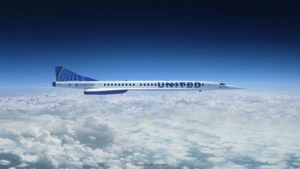 In what promises to be a dramatic rebirth of supersonic commercial passenger flight (which ceased when Concorde stopped flying in 2003), United Airlines has confirmed plans to buy 15 new supersonic airliners and begin flights beyond the speed of sound before the decade is out.
In what promises to be a dramatic rebirth of supersonic commercial passenger flight (which ceased when Concorde stopped flying in 2003), United Airlines has confirmed plans to buy 15 new supersonic airliners and begin flights beyond the speed of sound before the decade is out.
Several companies, mostly American, have been working on supersonic passenger prototypes. United has chosen the new Overture aircraft, to be produced by Denver-based company Boom. United aims to start supersonic passenger service with the Boom planes in 2029. Technically, the new aircraft should be able to halve flight times on sectors like Sydney/Los Angeles (though London/New York is the obvious money-spinner to start with).
A few years ago, Japan Airlines was reported to have made a strategic investment of USD 10 million in Boom and to be collaborating with the company to refine the aircraft design and work on the passenger aspect.
Supersonic passenger flight ended in 2003 when Air France and British Airways retired the Concorde, which first flew in 1976, way back when Malcolm Fraser was Prime Minister of Australia.
United says it will restore supersonic capability to the passenger transport world after a quarter of a century of abeyance – though there are still a couple of hurdles to overcome. Firstly, Boom has yet to test-fly a supersonic jet. Secondly, United’s agreement with Boom depends on the new aircraft meeting safety standards.
Boom Supersonic announced last year that its XB-1 test program would be fully carbon neutral through the use of sustainable aviation fuels and carbon offsetting.
“Since Boom’s founding, we’ve been on a mission to make the world dramatically more accessible through supersonic travel,” Blake Scholl, founder, and chief executive of Boom, said at the time.
“With our commitment to a carbon-neutral XB-1 test program, we’re laying the groundwork for a sustainable supersonic future with Overture.”
In June 2019, Boom announced its partnership with Prometheus Fuels, which Boom describes as “one of the most innovative companies in the field of sustainable alternative fuels”, to supply carbon-neutral jet fuel during the XB-1 test program.
Prometheus’ technology economically removes CO2 from the air and uses clean electricity to turn it into jet fuel. The electricity used in this process comes from renewable sources such as solar and wind, so there are no net carbon emissions from using the fuel. In January 2019, Boom successfully conducted a series of ground tests, running XB-1 engines using sustainable aviation fuels (SAF). These tests, powered by a blend of more than 80% sustainable fuel, gave the company the confidence that XB-1 can safely use SAF in future ground and test flights.
Boom says Overture would be able to cross the Atlantic, London to New York, in 3.5 hours, according to the BBC. That would shave three hours off the current flight time.
Boom’s supersonic aircraft is reportedly designed to fly at up to Mach 2.2, over twice the speed of sound. That’s about 2700 km/h, which is faster than Concorde. Concorde had a maximum speed of Mach 2.04 – about 1350mph or 2180km/h. Concorde was an enormous fuel guzzler, however.
Boom faces the challenges of limiting the sonic boom produced by passing through the sound barrier and cutting back on the sort of profligate fuel burn associated with Concorde.
Written by Peter Needham

















